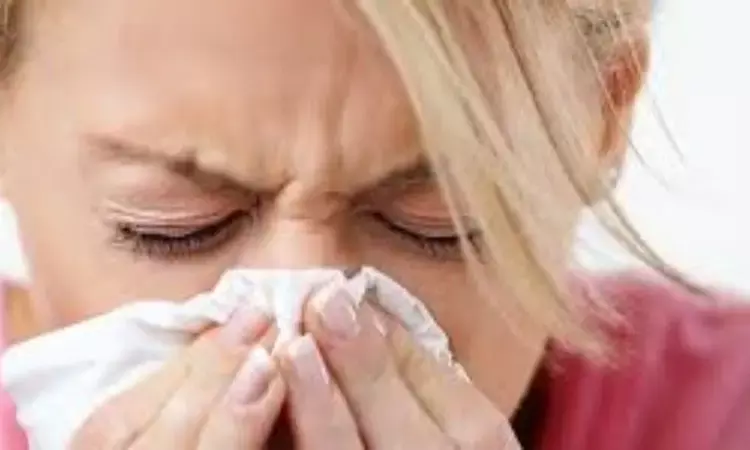- Home
- Medical news & Guidelines
- Anesthesiology
- Cardiology and CTVS
- Critical Care
- Dentistry
- Dermatology
- Diabetes and Endocrinology
- ENT
- Gastroenterology
- Medicine
- Nephrology
- Neurology
- Obstretics-Gynaecology
- Oncology
- Ophthalmology
- Orthopaedics
- Pediatrics-Neonatology
- Psychiatry
- Pulmonology
- Radiology
- Surgery
- Urology
- Laboratory Medicine
- Diet
- Nursing
- Paramedical
- Physiotherapy
- Health news
- Fact Check
- Bone Health Fact Check
- Brain Health Fact Check
- Cancer Related Fact Check
- Child Care Fact Check
- Dental and oral health fact check
- Diabetes and metabolic health fact check
- Diet and Nutrition Fact Check
- Eye and ENT Care Fact Check
- Fitness fact check
- Gut health fact check
- Heart health fact check
- Kidney health fact check
- Medical education fact check
- Men's health fact check
- Respiratory fact check
- Skin and hair care fact check
- Vaccine and Immunization fact check
- Women's health fact check
- AYUSH
- State News
- Andaman and Nicobar Islands
- Andhra Pradesh
- Arunachal Pradesh
- Assam
- Bihar
- Chandigarh
- Chattisgarh
- Dadra and Nagar Haveli
- Daman and Diu
- Delhi
- Goa
- Gujarat
- Haryana
- Himachal Pradesh
- Jammu & Kashmir
- Jharkhand
- Karnataka
- Kerala
- Ladakh
- Lakshadweep
- Madhya Pradesh
- Maharashtra
- Manipur
- Meghalaya
- Mizoram
- Nagaland
- Odisha
- Puducherry
- Punjab
- Rajasthan
- Sikkim
- Tamil Nadu
- Telangana
- Tripura
- Uttar Pradesh
- Uttrakhand
- West Bengal
- Medical Education
- Industry
Dialyzable leukocyte extract as adjuvant treatment of allergic rhinitis improves QoL of patients

Mexico: Dialyzable leukocyte extract (DLE), a peptide-based immunomodulator, might be a beneficial adjuvant treatment for allergic rhinitis (AR), a recent study has revealed.
The findings, published in Medicine journal, provide preliminary data for future research.
AR is the most common allergic disease worldwide, and treatment options for this persistent disease are limited; therefore, there is a continuous search for safe and new treatment options. It has a considerable impact on the general health of individuals. Therefore, treatment trials should include an evaluation of quality of life (QoL). Therefore, María Carmen Jiménez-Martínez and colleagues from Mexico aimed to determine changes in the quality of life of patients with moderate/severe AR treated with standard treatment, in addition, to dialyzable leukocyte extract. In a prospective, non-controlled trial, DLE was added to the standard treatment regimen for moderate/severe AR patients.
For this purpose, DLE was administered orally at 2 mg per day for five days, followed by 4 mg per week for five weeks, and then 2 mg per week for five weeks. The primary endpoints of the study were determined as overall improved Standardized Rhinoconjunctivitis Quality of Life Questionnaire (RQLQ) scores, individual item scores of 0.5 points or higher, and domain scores. The study enrolled thirty patients aged 14 to 60 years old.
The researchers reported the following findings:
- The mean overall basal quality of life score was 3.41 ± 1.22.
- After 11 weeks, the mean RQLQ score was 1.74 ± 1.09, and all the domain scores improved (daily activities, sleep, non-hay fever symptoms, practical problems, nasal symptoms, ocular symptoms, emotional).
- Each of the 28 individual item scores on the RQLQ showed clinical (minimal important difference [MID] ≥ 0.5) and statistical improvements.
"To the best of our knowledge, this is the first report of a peptide-based immunomodulator as adjuvant treatment for persistent moderate/severe AR patients," the researchers wrote.
"Previous clinical observations at our research unit indicated that DLE improved AR and asthma symptoms, but no similar studies have measured QoL in patients using DLE." They added that "this study is an important step towards quantifying clinical improvement by administering the RQLQ questionnaire before and after each treatment phase, including dosing changes."
The findings revealed DLE to be beneficial as an adjuvant treatment for AR. The results provide preliminary data for future research.
"Interestingly, the patients demonstrated additional improvement with increased treatment time, and dose reduction did not have a worsening effect," they concluded.
The study limitations include the lack of a control group, the small number of subjects, and the fact that only QoL was evaluated. Owing to these limitations, the researchers could not draw any definite conclusions regarding the efficacy of DLE until controlled, larger, multicenter studies involving different populations were performed.
Reference:
Homberg, Toni Angela MDa; Lara, Ivan MDa; Andaluz, Consuelo MDa; Cervantes-Trujano, Edgar MDa; Hernández-Martínez, Pedro Martín MDa; Pérez-Tapia, Sonia Mayra PhDb,c,d; Jiménez-Martínez, María Carmen MD, PhDe,f,*. Quality of life in adult patients using dialyzable leukocyte extract for allergic rhinitis. Medicine 102(27):p e34186, July 07, 2023. | DOI: 10.1097/MD.0000000000034186
Dr Kamal Kant Kohli-MBBS, DTCD- a chest specialist with more than 30 years of practice and a flair for writing clinical articles, Dr Kamal Kant Kohli joined Medical Dialogues as a Chief Editor of Medical News. Besides writing articles, as an editor, he proofreads and verifies all the medical content published on Medical Dialogues including those coming from journals, studies,medical conferences,guidelines etc. Email: drkohli@medicaldialogues.in. Contact no. 011-43720751


